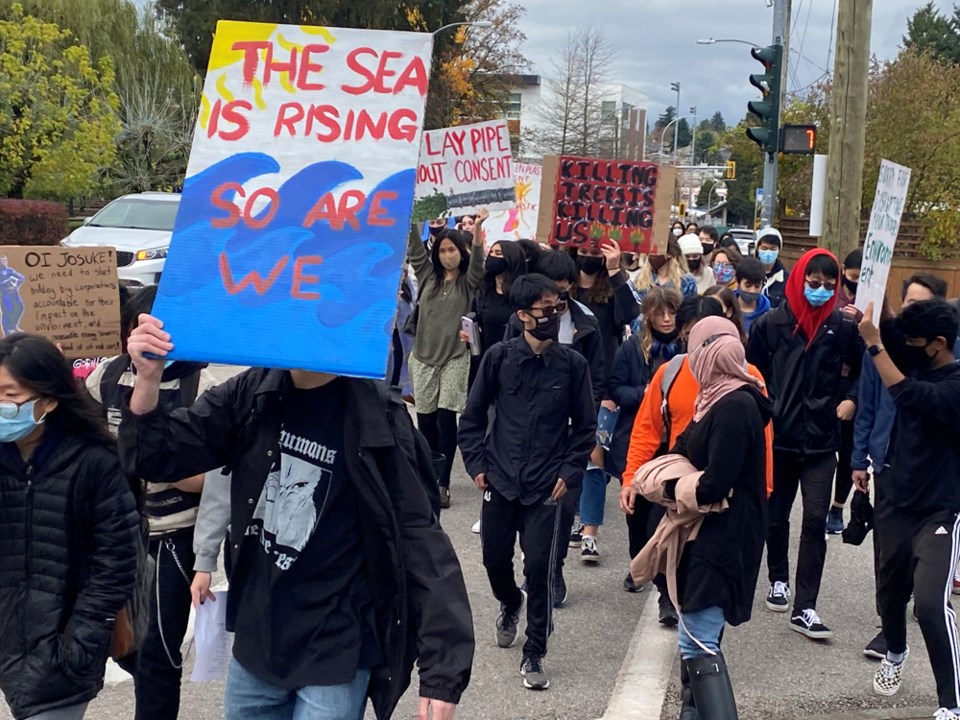Should the New Westminster school district create a high school course devoted to the climate crisis?
That’s one of the ideas that arose at the School District 40 board meeting Feb. 22, when students in the New Westminster Secondary School environment club gave a presentation to trustees.
The students told trustees the climate crisis isn’t sufficiently discussed in schools – and that, when it is, too much focus is placed on individual actions and not on the broader systemic picture.
Mark Zavorotny told the board he’s taken eight science classes in his time at New Westminster Secondary School. In all that time, he said, he only recalls one instance where he learned about climate science – with one eight-page chapter in an IB biology class.
“Eight pages over four years – that is distressingly low,” he said, adding that’s been the universal experience of the students who’ve discussed the issue with the club.
“Climate change is the defining issue of our time. It is an existential threat that will affect everyone and will literally doom us all if we do not do anything about it,” he said. “So it’s quite disappointing to see that it’s not really integrated into any of our lessons.”
When the climate crisis is discussed, Zavorotny said, there’s a lack of focus on how climate change is a systemic issue.
“Despite only 100 companies being responsible for 70% of the global emissions, things we’ve heard in our school … all focused on individual action: Turn off your lights when you leave the room. Lower the heat. Bike to school instead of driving. Take transit if possible,” he said. “All of this is great and necessary, but it also ignores how systems in which we live perpetuate and are really responsible for climate change.”
Grace Hodges agreed.
“What does it do to build climate movements for students when you’re telling them that the most important thing they can do in their immediate life is, like, ‘Turn off the light,’ instead of ‘Hey, connect with your community; start organizing.’”
Veronica Popova reminded trustees that the climate crisis is not just an ecological issue but a social one as well.
“What if we had a class that sort of combined the science aspect of the climate crisis and the social justice aspect of the climate crisis, because they’re both really important,” she said.
Locally developed course could cover geography, social justice, Indigenous issues: trustee
The idea of creating a climate course won support from trustee Anita Ansari, who suggested a locally developed course might help fill that gap. In B.C., school districts can create what are known as BAA (for “board/authority approved”) courses based on requirements set by the Ministry of Education.
“I think there's a really good opportunity here to have something that covers so many different aspects of teaching. There’s the geography piece. There's the social justice piece. There are the local events that we ourselves, our community and the communities in British Columbia have gone through,” she pointed out, citing issues such as the major B.C. storms that caused catastrophic flooding last year, B.C. wildfires and the ways in which the pandemic initially changed carbon dioxide levels.
Ansari added it would also be useful to bring in an Indigenous lens.
“I think this is a really great educational opportunity to have something that unifies all of those pieces, because I feel like, from my perspective as a parent of a smaller child, it's really difficult to wrap your arms around the whole thing,” she said.
Iain Lancaster, the district vice-principal of planning who’s leading SD40's climate action work, agreed there is plenty of information available to create a climate action or climate crisis course.
He also told the students he understands their frustration about the speed of change on the climate action front.
“I would be the first one to say that, not just from a personal standpoint but from a generational standpoint, we’ve ignored this climate crisis for too long. We older people are guilty of not taking action for far too long,” he said.
What has the New Westminster school district done about climate change?
The New Westminster school board passed a sweeping motion on climate action back in November 2019.
The motion committed the board to include a long-term climate action plan within its strategic plan, including setting measurable targets to reduce the district’s greenhouse gas emissions to help meet the recommendations of the Intergovernmental Panel on Climate Change (IPCC).
It also called on the district to provide leadership and support on climate literacy and environmental sustainability for students and staff in New Westminster schools.
It has since been pursuing a wide range of projects and activities to advance those goals, including requesting funding for capital projects (such as heat pumps and LED lighting) to improve the energy efficiency of schools, upgrading faucets to help conserve water, providing climate literacy resources for teachers, and offering grants for projects such as school gardens, field trips and waste reduction.
Follow Julie MacLellan on Twitter @juliemaclellan.
Email Julie, [email protected].



